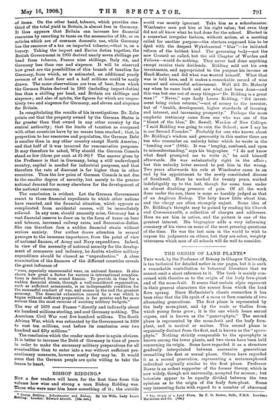BISHOP RIDDING.* NOT a, few readers will learn for the
first time from this volume how wise and strong a man Bishop Ridding was. Those who were near him knew something of it ; the outside
George ?Adding : Schoolmaster and Bishop. By his Wife, Lady Laura .Bidding. London: Edward Arnold. [Ida. net.] world was mostly ignorant. Take him as a schoolmaster. Winchester men put him at his right value; but even they did not all know what he had done for the school. Elected in a somewhat irregular fashion, without notice, at a meeting called for another purpose—the electors supposed him to be dyed with the deepest Wykehamical " blue "—he initiated reform of the boldest kind. The governing body—not the new Council so called, but the old Chapter of Warden and Fellows—would do nothing. They never had done anything except receive their dividends. Ridding sold out his own investments, and appropriated to the purpose his income as Head-Master, and did what was wanted himself. What that was is told here, and it makes a remarkable record of wise counsel and successful achievement. Well did Dr. Moberly say when he came back and saw what had been done—and this was but one out of many things—" Dr. Ridding is a great man !" "Never," says -Lady Laura Ridding, " did invest- ment bring richer returns,"—not of money to the investor, but of " health, development, higher standards of learning and interest, and increasing prosperity." Perhaps the most emphatic testimony came from one who was one of the " bluest of the blue," Dr. Sewell, Warden of New College. "I said Ridding was going to ruin the School ; now I say he is our Second Founder." Probably for one who knows about Dr. Ridding's wisdom and generosity in this matter there are ten who remember an unlucky letter which he wrote in the "Minding row" (1884). It was "lengthy, confused, and open to misunderstanding," says his biographer. "I do not know what fiend prompted me to write it," he said himself afterwards. He was substantially right in the affair; but this unlucky letter seemed to put him in the wrong. Two years afterwards his rule at Winchester came to an end by his appointment to the newly constituted diocese of Southwell. Here he worked for twenty years, worked indefatigably up to the last, though for some time under an almost disabling pressure of pain. Of all the work done under the sun, there is none so harshly judged as that of an Anglican Bishop. The laity know little about him, and the clergy are often strangely unjust. Some idea of Dr. Ridding's thought may be gained by reading his Church. and Commonwealth, a collection of charges and addresses. Here we see him in action, and the picture is one of the greatest interest. His biographer adds a very informing summary of his views on some of the most pressing questions of the time. He was the last man in the world to wish to impose his judgments on others, but they are sober, weighty utterances which men of all schools will do well to consider.














































 Previous page
Previous page